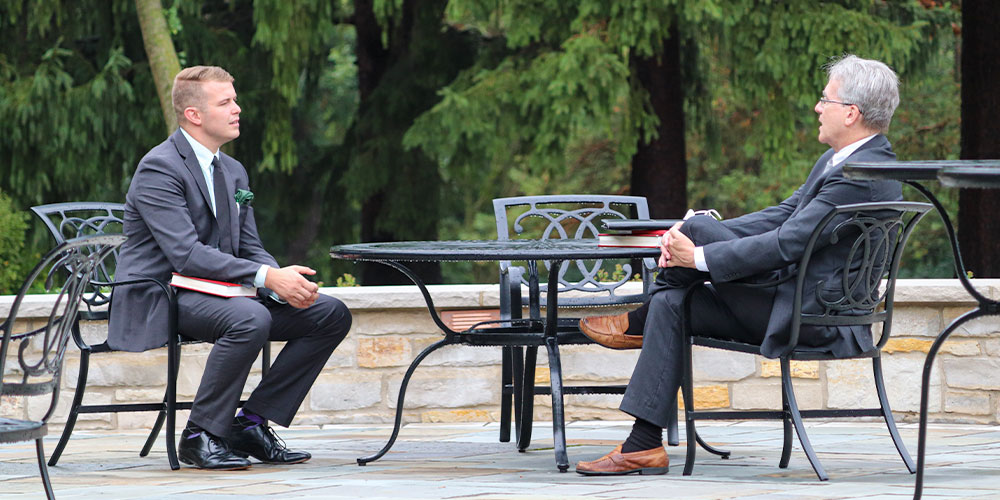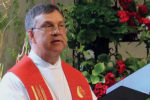 |
We train public ministers who boldly confess with their lips what fills their hearts.
Picture a pastor at a coffee shop. He’s with an unchurched prospect who visited worship and gladly accepted the pastor’s invitation to meet.
In conversation, the pastor’s words confess Jesus as the only way to heaven. Suddenly, warm lattes feel like iced coffees. The young man is offended that only believers in Jesus inherit heaven. To his worldview, that’s arrogant and closed-minded. As an open door seems to be slamming shut, will that pastor courageously continue to confess with Jesus what much of Christianity has become ashamed of: “I am the way and the truth and the life. No one comes to the Father except through me” (John 14:6)?
Picture a principal with angry parents in his office. Their adolescent daughter is struggling with gender dysphoria and has announced her preferred pronouns are now he/him. The parents are appalled that their daughter’s teacher isn’t supportive. They accuse the teacher of betraying the gospel’s heart: “Doesn’t Jesus accept us just as we are?” With the word lawsuit hanging in the air, does the principal find the courage to say, “Yes, God does declare us forgiven of all sin with no conditions. Yet forgiveness of sins is not permission to distort God’s loving design for our sexuality”? As a social media firestorm threatens to engulf him, will that principal continue to “gently instruct” (2 Timothy 2:25)?
Such challenges to confess the truth against opposition are no different from what Luther faced in 1521 at the Diet of Worms. Luther stood before the Holy Roman Emperor in a room overflowing with Germany’s lords and princes. They summoned Luther hoping either to intimidate him into renouncing what he taught or to sentence him to death.
At that pivotal moment in history, God’s grace enabled Luther to utter words still echoing around the world five centuries later:
Unless I am convinced by the testimonies of the Holy Scriptures or evident reason . . . I am bound by the Scriptures . . . and my conscience has been taken captive by the Word of God, and I am neither able nor willing to recant, since it is neither safe nor right to act against conscience. God help me. Amen.
Scholars debate whether the words “Here I stand” were even part of his statement. Yet those words summarize his confession. With his heart “taken captive by the Word of God,” Luther was unwilling to be moved from his confession, even if it cost him his life.
Here we still stand
Such courage to confess God’s truth is the prayer for our students preparing for ministry and for those who teach them. The task of Martin Luther College and Wisconsin Lutheran Seminary is to raise up a new generation of public ministers who courageously stand with Luther. We want them to be unafraid to speak God’s truth, whether in private counseling, public preaching, or classroom teaching.
Paul reminds us in these end times that “people will not put up with sound doctrine” (2 Timothy 4:3). So, in classroom and chapel, in individual conversation and small group settings, we seek to be the Spirit’s tools to instill in our students a biblical worldview centered on Christ’s cross for the world’s salvation. That’s how the Spirit enables us to say to our students what Paul said to Timothy: “The the Spirit God gave us does not make us timid, but gives us power, love and self-discipline” (2 Timothy 1:7).
In this way God prepares them to confess with Luther: “Here we still stand!”
Here I still stand
Luther’s bold statement that day in Worms was his confession. “I am convinced,” he said. Many will have to take their own personal stand for God’s truth. Together, united in their stand, they then carry out the Lord’s work. The faithfulness of the individual members of churches and the common conviction of our spiritual leaders are essential in carrying out Christ’s mission.
Our public ministers must not fall into the trap of parroting sound phrases from those who trained them without their own hearts being recaptured day after day by the wonder of God’s grace for each of them! Just as in the Nicene Creed, we confess our corporate faith (“We believe in one God”), so also it is still from the fullness of each individual heart that each mouth confesses in the Apostles’ Creed, “I believe in God, the Father almighty.”

That’s why we seek to fan into ever brighter flame the fire of faith the Spirit planted into each student’s heart. We don’t want resounding-gong or clanging-cymbal public ministers whose mouths know how to form impressive doctrinal sounds but whose hearts have ceased tasting for themselves how gracious God is to each of them. While the Spirit can always accomplish what he wills, it is difficult for public ministers to lead others to spiritual maturity when their own growth is stunted.
That’s why—even in courses that study Scripture—our primary goal isn’t just to fill minds with biblical facts or correct doctrinal formulas but to stir each heart anew to the wonder of the Savior’s love for each of them. That’s why we encourage students not merely to open their Bibles when class assignments (or later ministry duties) require it but to taste the Lord’s goodness for them in their personal devotional lives. That’s no legalistic requirement to keep God happy. It’s a hungry soul yearning for the Lord’s promises so it can share those promises with others.
The Reformation sprang, by God’s grace, from a troubled monk who found in Scripture the joy of his own salvation. That Word taught him to confess, “I believe that Jesus Christ, true God, begotten of the Father from all eternity, and also true man, born of the virgin Mary, is my Lord.” That joy in Christ’s forgiving love then overflowed into gospel-focused preaching and teaching that filled Christ’s church! Not even threats against his life could overcome the courage the Spirit breathed into him!
So too today: As present and future public ministers drink anew each day from the pure and refreshing river of the Water of Life, they find a joy that cannot be hidden. The Spirit-wrought conviction of “Here I stand!” blossoms into public confession, “Here we stand!” As the Spirit breathes into them such courage, not even the world’s dread frown will deter them!
Pray for our students studying for ministry. Pray for those who train and serve them. Pray that what filled Luther’s heart and became the bold confession of his lips will fill the hearts and become the bold confession of every public minister trained at our schools! Only then will “Here we stand!” remain more than a relic of Lutheran history. Then, with Luther, what fires our hearts will remain the bold confession of our lips!
Author: Richard Gurgel
Volume 108, Number 7
Issue: July 2021








